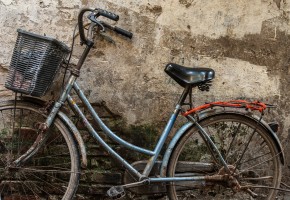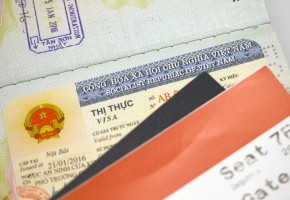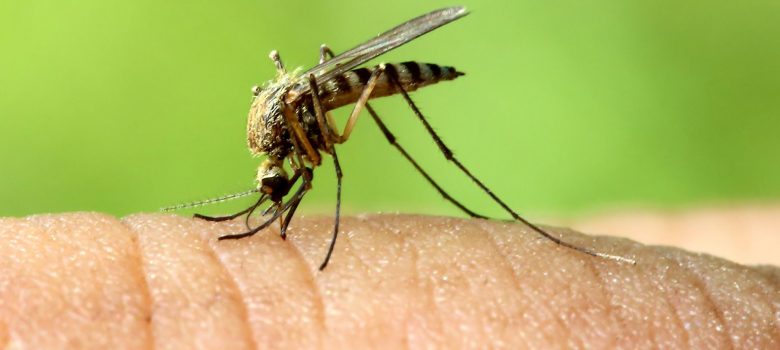
Health, safety & insurance
Overview
Vietnam is a developing country, and how to stay healthy should be part of every traveler’s thinking.
Overall, Vietnam is a great, safe place to travel. It has good Western style medical facilities and clinics in the major cities (often with prices to match), and the incidence of tropical disease is relatively minor.
With a little care, you can have a great trip to one of the most extraordinary countries in South East Asia.
Here we bring together a lot of distilled experience on health, safety & insurance — it can be hard to find reliable information on the internet. While we try and stay up to date, if you have particular medical or other needs you should of course check with your health provider and insurance company before you leave home.
Being a developing country, with a mostly tropical monsoonal climate, the major health risks for travelers are: bad food or contaminated water; illness from mosquitoes & animals; sunburn & heat stroke from exposure to the tropical sun; and road accidents.
With a little common sense, eating and drinking at local cafes, bars, restaurants and street food vendors is fine – in our experience, far fewer travelers get upset stomachs in Vietnam than in most other developing countries.
This is great news, because Vietnamese street food is much too good to miss!
In cities and major towns, there is almost no malaria, and with reasonable care you can minimize the risk of mosquito-borne diseases. Take precautions against the tropical sun and be sensible about roads and traffic in and around the cities and you’ll be fine.
Traveling in rural and remote areas is a different story — it’s all fine, but you need to take more care.
The incidence of mosquito related diseases is higher in the countryside, levels of restaurant hygiene tend to be lower, and there is greater risk of disease contracted through animals.
Accidents (mostly self-inflicted) seem to happen more often in the countryside as well – we see a lot of travelers wearing inadequate clothing while riding a rented motorcycle, or riding too fast in foggy weather, or trekking in poor footwear, or drinking and then driving their motorbike, or not protecting themselves against sunburn.
As you would expect, medical services in rural areas are limited. It can be a long way to the nearest reasonable medical center, and the quality of medical facilities is lower than in the cities.
Using common sense should still mean that the chances of needing medical help are very small, but you should always have good travel insurance — which includes evacuation to city centers — if you are planning to spend time in rural and remote areas.
Health & safety
Recommended & Other Vaccinations; Disease Prevention
Ensuring you have the correct vaccinations before you come will go a long way to reducing risks and keeping you healthy.
The following information is just a guideline, and you should check with your health provider for specific advice and prescriptions.
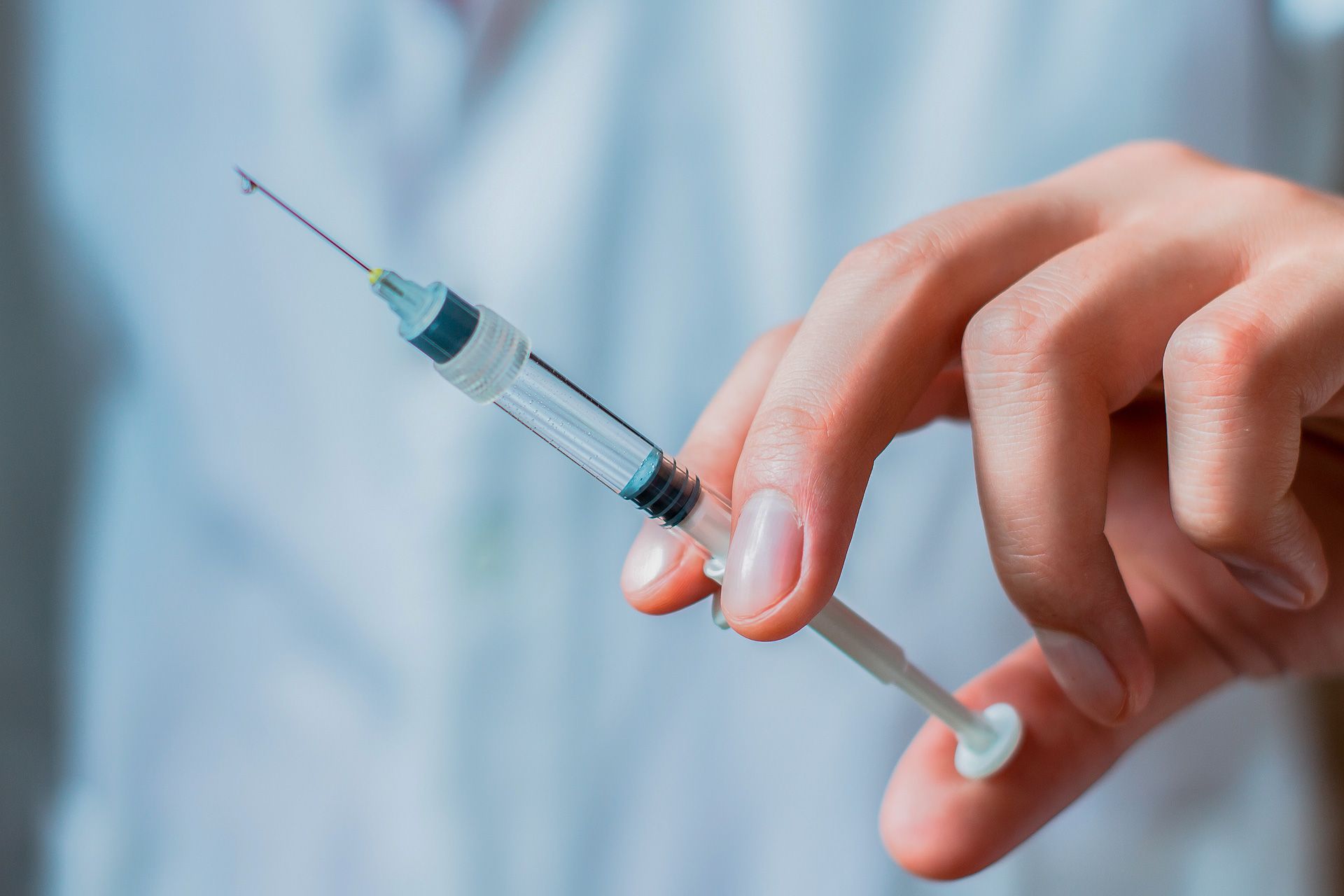
Vaccination shots needed will vary among individuals — including the types of activities you are planning, the areas you plan on visiting, the length of your stay, and your overall health.
We recommend that you consult with your health provider at least 6 to 8 weeks prior to your departure date to assess your specific health risks before deciding on vaccines and other meds, including anti-malarial tablets.
While there are no compulsory vaccinations for travel to Vietnam, the Center for Disease Control and the World Health Organization recommend a range of vaccinations or boosters, including diphtheria, hepatitis A & B, tetanus, typhoid and rabies (for travelers likely to be trekking or exposed to rural animals).
In general, more extensive vaccinations are suggested for those traveling in rural areas or planning extended trekking or other outdoor activities. Some might view this level of vaccination as conservative, as the risks of getting any of these diseases are low, but in our view prevention is easier than cure.
Note that it may take several weeks for a vaccination to become effective – so plan ahead and consult your doctor early.
Recommended vaccinations: diphtheria, hepatitis A, tetanus, typhoid
Diptheria – This air-borne disease spreads from person to person through the respiratory system. The risk of infection is higher, naturally, when mixing with the locals in overcrowded, poor living conditions.
Most people are vaccinated against diphtheria during childhood; a single booster is a good idea if you have not had one in the previous 10 years — check with your doctor.
Hepatitis A – This food-and-water-borne virus, affecting the liver, is a problem in areas where hygiene and sanitation are poor. Apart from allowing time for the liver to heal, it has no specific treatment.
The initial vaccine provides effective protection for 12 months; a booster after that provides much longer protection. Check with your doctor.
Tetanus – Also called lockjaw because of the muscle spasms that typically begin with the jaw and then progress to the rest of the body, tetanus is caused by bacteria, usually found in soil, dust and manure.
It enters the body through a wound or break in the skin. Most people are vaccinated in childhood, but check with your doctor to see if you need a booster.
Typhoid – Caused by bacteria found in contaminated food and water, you should consider vaccination if you are an adventurous eater and you plan to venture outside the major cities, or plan to be in Vietnam more than a week.
The risk of infection is higher in rural areas which have less than adequate sanitation and personal hygiene.
Note that the vaccine is only about 70% effective (so take care with what you eat and drink) and lasts for only a few years. Check with your doctor.
Other vaccines to consider: hepatitis B, Japanese encephalitis, rabies, measles / mumps / rubella, cholera
Hepatitis B – This vaccine is standard for most travelers. It is typically given to children soon after they are born, and generally lasts a lifetime.
Most travelers will not need further vaccination against this liver-cancer-causing, sexually transmitted disease. Best to check with your doctor to ensure your Hep-B antibodies are still up to count.
Japanese encephalitis – This viral disease, for which there is no treatment once contracted, is transmitted by mosquitos.
Although it is extremely rare for short-term travelers to contract this disease, vaccination (and a booster after a year) is recommended for people who plan to spend a lot of time (months) in rural areas. Check with your doctor.
Rabies– If you are prone to petting stray dogs (as we are), it is probably best to protect yourself from rabies. It is generally contracted through the saliva (from a bite or lick) of an infected animal, primarily dogs, but also bats and monkeys.
Even with a pre-bite rabies vaccine, you should still get urgent post-exposure treatment after any biting incident. Rabies vaccination can require multiple injections over some weeks, so plan ahead.
Measles, mumps & rubella – Unless you had the diseases as a child, two doses of the vaccine are generally recommended. Check with your doctor; a booster is often required for young adults.
Cholera – Contracted mostly through drinking contaminated water, cholera can be avoided by taking basic precautions with food and drink and by maintaining a good standard of hygiene.
Cholera is rare in Vietnam, but after declining for more than a decade the number of reported cases has increased somewhat recently (2017) in the rural South. As a general rule, do what the locals do and drink bottled water which can usually be found in even the most remote places. Check with your doctor about vaccination.
Required vaccination certificate: Yellow fever
There is no risk of yellow fever in Vietnam, but travelers may need proof of vaccination if you are arriving from a country that does have a risk of yellow fever. See here for more details.
Disease prevention: bugs and birds
Zika – We all know the annoyance of mosquitos and the effects of their bites, but Zika carrying mosquitos are a different matter, and there is no vaccine to protect against the Zika virus, nor medicine to counter-act it. Zika has had, and continues to have, occasional reported cases in Vietnam.
While the chances of getting bitten by a Zika mosquito are very low, it is sensible to take precautions. Regular mosquitos are at their worst at dusk, but the Zika-transmitting mosquito, which can also carry dengue fever, chikungunya virus and other infections, bites both day and night.
Without getting too anxious about it, precautions include applying a (preferably DEET-containing) mosquito repellent, and wearing insect-proof clothes (long sleeves, long pants) when you are outdoors, especially in the hot, rainy months.
Due to the risk of birth defects in Zika-infected women, it is recommended that pregnant women traveling to Vietnam, or those planning to become pregnant shortly after coming to Vietnam, should consult their doctor, and be extra careful about protecting themselves — and consider postponing their travel. Note that Zika can also be transmitted through sex, so play safe!
For more detailed information on the Zika virus, click here.
Malaria – Also transmitted by mosquitoes, malaria is another serious illness that cannot be prevented by vaccination. The varying degrees of risk of malaria range from low to no risk in the urban areas of Ho Chi Minh City and Hanoi, to somewhat higher risk in the Red River and the Mekong deltas, the southern island of Phu Quoc, and Vietnam’s coastal plains.
For more detailed information and to view a Vietnam malaria map, click here.
Your best bet to avoid malarial mosquito bites is by covering up, using DEET-containing insect repellents, and, when possible, sleeping under a mosquito net or in mosquito-proofed interiors.
If you are planning a more urban, less jungle-based trip, your chances of contracting malaria are so remote that antimalarial tablets are not usually advised. Ask your doctor about the need for these tablets as well as the possible health risks associated with them.
Dengue fever – Another mosquito-transmitted disease that has become more common in Vietnam – in the recent past, as recent as 2021, there has been a significant number of outbreaks, some fatal, in the major cities and a number of rural areas, including the Mekong Delta, the Red River Delta and the coastal districts of Central Vietnam.
Again, there is no vaccine available, and therefore prevention is the best option — use a 20-30% DEET repellent, wear light or neutral-colored breathable long pants and long sleeved shorts. The dengue-carrying mosquito is most active at dawn as well as a few hours before sunset, especially during the hot, wet season.
If you suspect you may have been infected by a dengue-carrying mosquito (symptoms include severe joint, bone and muscular pain, fever, and headache), see a doctor for diagnosis and monitoring.
Bird Flu – Occurring mostly in the countryside, and mostly among poultry workers, has had its share of reported cases.
As the virus is spread from infected poultry to humans, we recommend that the best prevention is to avoid sources of exposure. We also suggest that you be cautious and eat only poultry and eggs that are well cooked.
Food & drinks

A large part of the attraction of Vietnam is the endless selection of fantastic food and drink, and it really would be a shame to turn down some of those delicious treats because of fears of food poisoning or upset stomachs. That being said, it doesn’t hurt to apply common sense and take basic precautions.
Basics
-
Water – In general, Vietnam does not have potable water (with the surprising exception of the town of Dalat, otherwise known as the “city of eternal spring”, which boasts having potable, treated spring water).
Drink only bottled or filtered or boiled or treated water! It’s what the locals do.
Nearly all reasonable hotels will filter / treat their water, so cleaning your teeth in their tap water is OK; we do it. But even these hotels will still provide bottled water for drinking.
The major cities and some towns chlorinate / treat their town water, but this does not remove chemical or heavy metal contaminants, and the locals still drink bottled water. Even in Dalat, we drink bottled water.
Inexpensive bottled water is available almost everywhere, even in the most remote places.
-
Ice – Visitors often refrain from having drinks with ice cubes, but fortunately, in Vietnam, unlike many other developing countries, restaurants, bars, and street vendors generally use ice that is made at a central plant from purified, filtered water and delivered to them.
This is because the locals don’t want ice not made from safe water. Except in small villages, there is generally no need to worry about the safety of the ice, and there is really no need to turn down any of those cool, delicious, refreshing drinks – but use your common sense.
If you still feel uncomfortable about taking ice in your drinks, just ask (or gesticulate for) the vendors not to put any in your drink, or choose a beer or soft drink instead. No ice is “không đá” (pronounced roughly as kong dar).
If you can’t get understood by speaking, use your smartphone and Google Translate – it works well!
-
Salads – Salads, herbs and green leaves are an important and delicious part of Vietnamese cuisine.
A bowl of herbs and green leaves will often accompany a dish like bún chả (pronounced bun char, with u as in put; it is a rice noodle soup with grilled pork pieces – incredibly good; (Obama had it when in Hanoi), the idea being that you can add the herbs and leaves to the soup to flavor it.
You won’t really know what kind of water the leaves or other parts have been washed in, so you will have to use your common sense: a busy street vendor or restaurant or bia hoi in a major city is almost certainly OK and we would eat the salad every time; an unclean-looking stall with no customers in a tiny village maybe not.
Ask around; ask your guide if you are travelling with one. If in doubt, don’t eat the salad.
-
Sanitation – For the most part, at least in the more populated cities and centers, Vietnam’s sanitation standards are better than in many other developing countries in Asia, and, thankfully, there are far fewer cases of food poisoning.
This is partly attributable to the fact that so much of the food in Vietnam is prepared to order and served fresh fresh fresh!
You should, of course, follow the usual precautions, especially when eating local. Choose your restaurants carefully, eat where the locals eat, not where the tourists are!
Food allergies & aversions
-
Fish sauce – Used in so many dishes, nước mắm (pronounced nook (like book) ma(r)m) is a delicious, pungent sauce made from fermented anchovies, and is without doubt one of the most commonly used sauces throughout Vietnam.
It may make food taste fabulous, but many people are allergic to it because of its fish base.
If you have a fish allergy, be firm and try to make the vendors or restaurateurs understand that it is harmful to you: say “không cá” (pronounced kong car — không means no, and cá means fish) with strong ‘no’ gestures with your head, arms, etc. Hopefully this will get the message across. Or use Google Translate.
-
Peanuts – Widely used in Vietnamese cuisine, they add crunchiness, taste, and saltiness to a wide variety of dishes. So, if you have a peanut allergy, tell your server or stall owner “không lạc” (pronounced kong la(r)k).
Or, use Google Translate. In worst case scenarios, draw a picture! Really! It works.
-
Other “foods” – Well-meaning hosts may offer you dog, cat, horse, alligator or other meat (or other food) that you may be averse to eating for some moral or ethical or culinary reason.
You don’t need to eat it! (if you don’t want to).
However, always ask what it is and make your preference known before you pick it up with your chopsticks.
You could say: “không, xin cám ơn, tôi không ăn” (pronounced kong, sin ca(r)m oon, toy kong a(r)n). It means: “No, thank you very much, but I don’t wish to eat that”, and it is a polite way to tell them that you can’t eat it.
Other factors: sun exposure, skin conditions, pollution
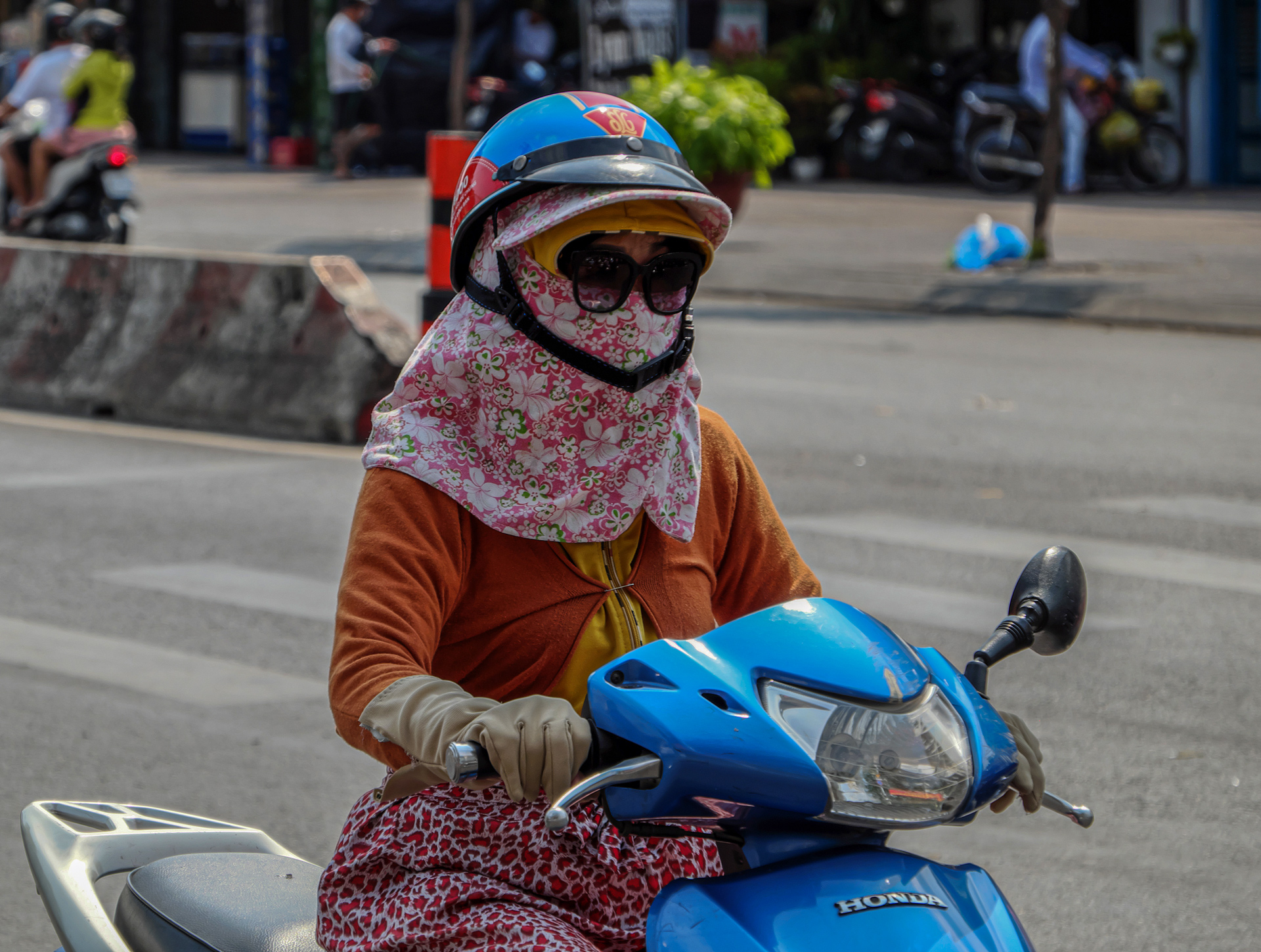
Sun exposure
The sun in Vietnam can be intense with very high UV levels, and you should protect yourself if you’re going to spend time outdoors, even for brief periods. UV levels can also be high on cloudy days, enough to cause serious sunburn.
The locals (especially the women) cover up when UV levels are high with hat, face mask, gloves, long sleeves, socks, sunglasses being common when on their motorbikes.
So follow their example and keep the sun off your skin as much as possible with protective clothing and a hat, and by using SPF 30+ sun cream.
Vietnamese see a lot of westerners exposing a lot of skin, both walking and riding a motorbike, and consider it plain dumb.
Skin rashes
The humidity levels in Vietnam are often stickily high, and coupled with sweat from the heat, skin rashes are common – they can really take the pleasure out of your travels.
Wearing lightweight, breathable clothing that wicks moisture away; changing your clothes often; and keeping your clothes clean and dry are your best options.
Noise pollution
Most of Vietnam is in a perpetual state of construction, and the noise, coupled with the incessant honking of motorbikes and cars can be aggravating.
The Vietnamese barely notice it, but you will, particularly at night when you are trying to sleep. Even in the countryside it can be noisy – you might get a karaoke bar next to the hotel you chose so carefully.
The only solution is to bring several pairs of good quality ear plugs, and patience.
Air pollution
Air quality, especially in Ho Chi Minh city and Hanoi, can at times be a cause for concern, especially for people with asthma or allergies. It’s not (yet) anywhere as terrible as some Chinese or Indian cities, but on bad days it can be serious enough to want to take precautions.
We suggest wearing a filter mouth-mask (bring your own, or buy at most pharmacies) on those days when you are spending extended periods of time outdoors, particularly if you are riding a motorbike, and you see the locals wearing them too. On bad days, visibility will be poor and the pollution pretty obvious.
In contrast, air quality in the countryside is very good, except when the farmers are burning off after harvest late in the year, but that tends to be pretty localized.
Pharmacies & hospitals, medical care
Pharmacies
Pharmacies are common in Vietnam, both in the major cities and smaller towns. They are often open extended hours, and most will sell medicines to foreigners across the counter without a doctor’s prescription, so in general it is not hard to get access to medicines.
Most medicines available in pharmacies are made in Vietnam and sold under local brand names. Our own experience is that they are inexpensive; have the same active ingredients and are as good as medicines sold in America, Europe or Australia; and have sufficient readable labeling that with some care you can be sure you are buying what you think you are.
If you take photos with your smartphone before you leave home of the medicines you may want to buy, including active ingredients, this will greatly help you and the pharmacist ensure you get the right thing.
Although our experience has been very positive, there are some who worry that the quality or authenticity of pharmacy medicines may not be as high as in western countries. To err on the side of caution, you might wish to bring your essential medications; in fact, bring extras, in the case of loss or theft.
We also recommend that you bring a letter from your doctor describing any recent medical procedures (ECG, surgeries, etc.), as well as any need to carry needles or syringes where you have existing health conditions requiring them.

Hospitals & clinics
There are several good (but expensive) medical facilities, hospitals and clinics in the larger centers that service foreigners, with English-speaking doctors and nurses. Smaller, more remote towns don’t have such services. If you are not traveling with an English speaking guide, make sure you carry a phrase book with a reasonable medical section — in remoter areas, you can’t be sure you will have internet and Google translate.
The hospitals listed below can provide good medical treatment in Vietnam (if you’ve got either cash or insurance); however, in the extremely unlikely event that you need advanced medical services, we think the best option is evacuation to Singapore or Bangkok, if feasible (good to have this covered in your travel insurance).
In general, we suggest avoiding local Vietnamese-language hospitals if possible, if for nothing else than the language challenges, and sticking to the foreign-run institutions. However, we do give the thumbs-up to one local Hanoi hospital which offers good, affordable, (basic) English service in an immaculately clean, relatively new building:
Hong Ngoc Hospital
55 Yên Ninh, Trúc Bạch,
Ba Dinh District, Hà Nội
Tel: (024) 3927 5568
International hospitals in Hanoi
- Vinmec International Hospital (24-hour emergency services)
#458 Minh Khai, Vĩnh Tuy,
Hai Bà Trưng District, Hà Nội
Tel: (024) 3974 3556
www.vinmec.com - Raffles Medical Hanoi (24-hour emergency services)
#51 Xuan Dieu, Tây Hồ, Hanoi
Tel: (024) 3676 2222, (024) 3934 0666
Email: [email protected]
www.rafflesmedicalgroup.com/international-clinics/locations/vietnam/hanoi - French hospital (24-hour emergency services)
#1 Phương Mai, Dong Da, Hanoi
Tel: (024) 3577 1100
www.en.hfh.com.vn - Hanoi Family Medical Practice
#298 / Kim Ma Street, Van Phuc Compound
Ba Dinh District, Hanoi
Tel: (024) 3843 0748
www.vietnammedicalpractice.com - Saint Paul Municipal Hospital (24-hour emergency, but sometimes limited or no English)
12 Chu Van An, Hanoi
Tel: (024) 84 37 231
www.stpaulshospital.org - Serenity International Dental Clinic
19 Nguyễn Trường Tộ, Nguyễn Trung Trực
Ba Dinh District, Hanoi
Tel: (024) 3718 3666
www.dentaldepartures.com
International hospitals in Ho Chi Minh city
- Victoria International Healthcare Clinic (24-hour emergency services)
79 Dien Bien Phu, District 1, Ho Chi Minh City
Tel: (028) 3910 4545
www.victoriavn.com - Franco- Vietnamese Hospital (24-hour emergency services)
6 Nguyen Luang Bang St, District 7, Ho Chi Minh City
Tel: (028) 5411 3333
www.fvhospital.com - Medical Diagnostic Centre
254 Hoa Hao, District 10, Ho Chi Minh City
Tel: (028) 3834 9593
www.medic-lab.com.vn - Westcoast International Dental Clinic
27 Nguyen Trung Truc, District 1, Ho Chi Minh City
Tel: (028) 3825 6999
www.westcoastinternational.com
Insurance
While the chances of getting sick, having things stolen, or having some type of an accident are low while traveling in Vietnam, you should check with your insurance company to ensure that your policy coverage includes Vietnam, and if not, we advise you to buy travel insurance to cover you on your trip.

If you’re planning to ride a motorbike in Vietnam, your insurance company will most likely cover you only if you have a Vietnamese motorbike license or an International Driving Permit (IDP). It’s best to ask your insurance provider what is and isn’t covered.
For more details on motorbike licenses required to ride in Vietnam, click here (NEED TO ADD HYPER LINK).
If outdoor adventures such as trekking, mountain climbing, rock climbing, mountain biking, kayaking, sailing, diving, or kite surfing are on your to-do list while in Vietnam, you should ensure that your insurance coverage includes outdoor pursuits.
In the case of an accident or medical situation occurring and you need to be admitted to a hospital, you want to make sure that you are carrying your insurance card, or alternatively lots of cash or a credit card. The international hospitals will refuse to admit you without one of those three. No exceptions.
In the unfortunate instance of theft, be it personal effects, luggage, etc., we again advise you to establish coverage with your insurance company before you come. We also suggest taking photos of your things to aid in subsequent insurance claims.



